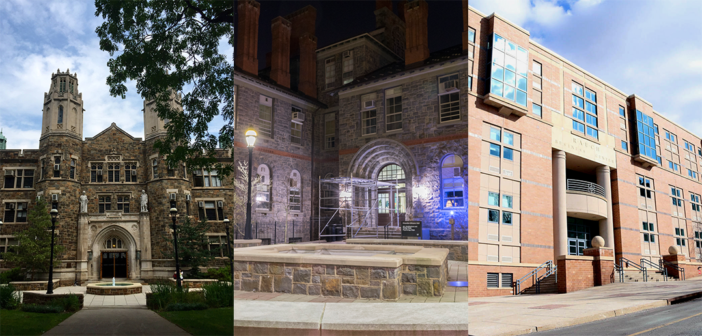Multiple buildings on Lehigh’s campus will undergo renovations in the near future.
The buildings that will be renovated are Rauch Business Center and Chandler-Ullmann Hall, while Packard Lab is still under consideration for renovations.
Donald Hall, the dean of the College of Arts and Sciences, said a building’s age and condition are the most important factors when choosing which to renovate.
“It’s the buildings in the worst shape that go first,” Hall said.
He said Chandler-Ullmann has been on the list of buildings to be renovated for many years, and there are plans to begin renovation in the next year and a half.
Built in 1884, Chandler-Ullmann is one of the many historic buildings across campus that have not received renovations. The overall number of buildings on campus has led to long waiting periods for planning renovations and allocating funds so students and staff can use the buildings to their full potential.
For Chandler-Ullmann in particular, poor condition and a lack of basic infrastructure and accessibility for disabled students were part of the decision to renovate it.
University architect Brent Stringfellow said while many buildings might not have features like elevators or air conditioning, all of the buildings on campus function properly and are safe spaces to occupy. He said a building’s stability is his top priority.
Stephen DeWeerth, dean of the P.C. Rossin College of Engineering, said he wants the engineering school to focus on cutting-edge technologies and facilities when conducting building renovations.
“To be competitive with the best universities, I think we need to have the best laboratory facilities,” DeWeerth said, “so I think that should be a priority.
DeWeerth said Packard Lab, built in 1929, is being considered for building renovations. He said the building wasn’t constructed to house the laboratories and technology needed for up-to-date research.
DeWeerth said the university maintains a balance between renovating academic buildings and social buildings, such as the University Center and residence halls. He said choosing opportunities that will resonate with donors and fundraising well is also important.
Hall said funding and priority for these projects is based on which area needs it most.
“The colleges don’t have to provide any funding,” Hall said. “It’s all done through the central budget, and then (the funding is) targeted where the greatest need is.”
In 2016, the construction of the new Lehigh University Police Department station was given priority over other renovations to allow police to extend its presence off campus. The station cost $4.9 million.
Rauch Business Center is also on the list of renovations to make room for more classrooms and offices. Staff members have been forced to use study rooms and breakout rooms for offices due to the lack of space.
Stringfellow said the Rauch and Chandler-Ullmann expansions are undergoing pre-design studies, meaning the scope of the project is still being determined. Basic conceptual design parameters are also being established and a budget is being developed. He said the university is not committed to a project until it leaves its pre-design study.
Stringfellow said he looks at the Rauch project as an update or modification rather than a renovation, since the building isn’t being gutted and it is relatively new compared to other buildings on campus. He said many fundamental amenities in Rauch have been taken care of, such as air conditioning upgrades and a roof replacement.
Smaller projects like fixing roof structures, air conditioners and broken windows are usually completed over the summer.
While nothing has been officially decided, a new research building might also be built for both the engineering school and future College of Health as part of the Path to Prominence initiative. DeWeerth said having both of these colleges in one building will allow people to work together in an interdisciplinary research neighborhood.






Comment policy
Comments posted to The Brown and White website are reviewed by a moderator before being approved. Incendiary speech or harassing language, including comments targeted at individuals, may be deemed unacceptable and not published. Spam and other soliciting will also be declined.
The Brown and White also reserves the right to not publish entirely anonymous comments.